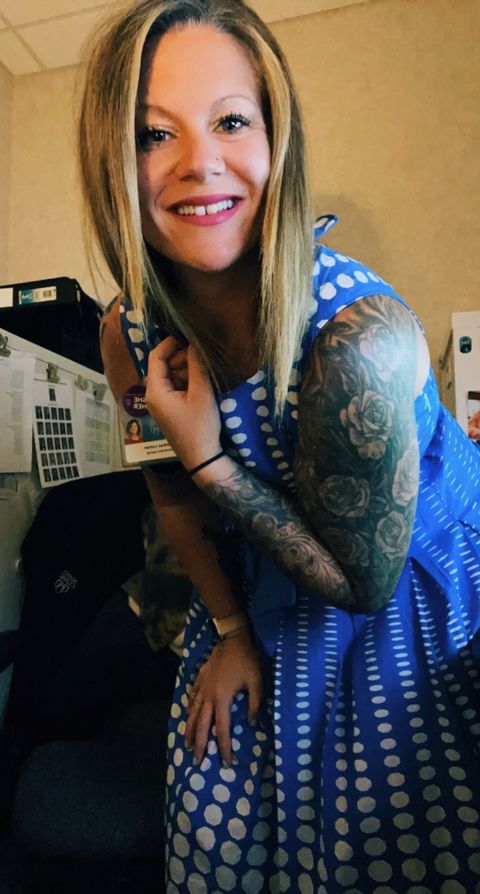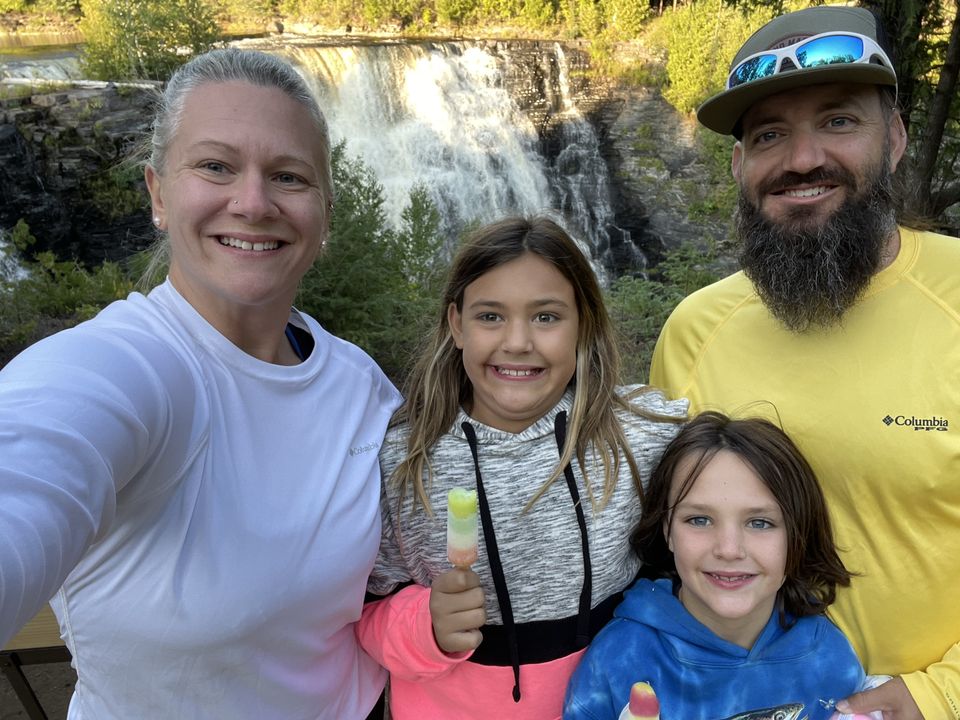September 20, 2022 - Marissa Larson hails from Moscow, Idaho, where she was adopted by her two loving parents the day after she was born. Marissa's deafness was discovered when she was three years old. Her parents decided to take her to the audiologist after noticing that Marissa didn’t respond to commands. During the exam, the audiologist was suspicious that she was reading her lips, so she decided to cover her mouth. Marissa threw a huge fit by throwing blocks around the room, which is how they found out she was Deaf. She was then fitted with hearing aids. However, that did not stop Marissa’s adventurous spirit! Marissa was always on the go, wanting to learn everything about this world. Being the only Deaf person in her family, it was a struggle growing up. However, her parents made sure to accommodate Marissa’s education and social life the best they could. They made sure Marissa had an ASL interpreter and a speech therapist. She participated in sports and after-school clubs such as Girl Scouts and playdates. Even though Marissa did not like seeing the speech therapist, she is thankful to be able to use her voice today. Elementary school was hard on Marissa as the only Deaf student; she was bullied and often left out of things. Marissa also struggled with her identity, not knowing who she was because she’s Deaf in a Hearing world, and by being adopted, she felt like something was missing from her life. However, Marissa excelled academically and in sports by having a can-do attitude and never giving up.
At 12, Marissa and her family moved to Dallas, Texas, after her father graduated college with a nursing degree and accepted a job at Parkland Hospital. The move was a huge culture shock for her because she was not exposed to different cultures in Idaho, especially the Deaf community. Marissa was captivated by a middle school that had a Deaf program. Although mainstreamed, she participated in sports and after-school activities with her hearing and Deaf peers. Learning about the many different cultures at one time was not a struggle for Marissa. It motivated her to have an open mind and helped her realize that she was not alone. Marissa made a few close friends even though it was hard for her to “fit in” due to not knowing sign language very well. She was picked on a lot due to being “oral” and white in a predominately Hispanic and black school. She then went to Townview Magnet High School, which had six different schools in one; Marissa chose Law School. While this school was packed with culture, language, and thousands of students, Marissa enjoyed the atmosphere, and by being able to have access to interpreters for the first time, she felt like she could see a future for herself. At the end of 10th grade, her parents announced that the family was moving to Rochester, MN, so her dad could return to school at Mayo Clinic to advance his career.
Marissa felt like her world came crashing down again at the news, dreading having to start over again. Marissa then joined Minnesota State Academy for the Deaf (MSAD) for her last two years of High School. While it was another culture shock for her, Marissa enjoyed living on campus surrounded by Deaf individuals because she no longer felt alone. Marissa then went off to NTID/RIT, and after one year, she transferred to Gallaudet University and graduated with a BA in Social Work. Her college years were hard on her, and being on the swim team at Gallaudet University was her only escape.
After graduating, Marissa moved to Chicago, IL, Ohio, and then back to Minnesota, all while trying to figure out her future because she could not find her norm. Her norm was drinking, and she was struggling to find her happiness. It was then that Marissa realized she had a drinking problem. One morning, Marissa woke up in a jail cell after driving drunk. At that moment, Marissa promised God that if she were to get out, she would do everything she could to stay sober. And she did. Marissa went to treatment for a month and attended many meetings. To help her stay sober, Marissa adopted her ‘sober dog’ Sky, who has helped her focus on what is important. Today, she has eight years of sobriety and could not be more grateful for what she has today. Her sobriety means a lot to her, and she has never been happier because now she has a fiance she loves with all of her heart and two beautiful children, Aria and Mathias.
Marissa currently works at the #1 hospital in the nation, Mayo Clinic in Rochester, Minnesota, which is now top-ranked in fourteen different specialties. Marissa works in the Ear, Nose & Throat department as a Clinical Research Coordinator under Principal Investigators' guidance (Doctors, Physicians, Surgeons, etc.) and is tasked with administering clinical trials. Her primary responsibilities include managing clinical trials, collecting data, informing participants about study objectives, and administering questionnaires. Marissa mainly works on the Head & Neck side while her co-workers work on the Rhinology and Audiology side. Many of the studies Marissa works on are rare diseases or cancers. It is her responsibility to help researchers conduct their studies without violating HIPAA (Health Insurance Portability and Accountability Act). Marissa maintains all the study files and ensures the team follows all the applicable laws and regulations. Marissa also helps with the data portion of these studies and makes sure they are entered into the databases accordingly.
One of Marissa’s favorite things about her job is when she gets invited to go to the OR, change into scrubs and watch the surgeon perform surgery. The last one she watched was a surgery called Endoscopy Transsphenoidal Approach to Pituitary, basically removing a pituitary tumor. The pituitary gland is located at the bottom of your brain and above the inside of your nose.
Marissa’s favorite thing about working in the ENT Department is meeting patients from different parts of the world and bringing them inspiration and hope. Many of these patients come to Mayo Clinic looking/hoping for a cure for their diseases or the type of cancer they may have, and Marissa feels she must be a part of that hope. Mayo Clinic’s mission statement is, “Inspiring hope and promoting health through integrated clinical practice, education and research.” Putting the patient first allows research to find cures for future generations successfully. To be a part of that is very rewarding, and Marissa benefits from knowing she helped advance research.
When Marissa was hired in 2015, the first six months were arduous for her due to the lack of accessibility by needing an American Sign Language (ASL) interpreter and a VideoPhone to do her job. Her job requires a lot of communication with co-workers and patients. Not having a way to communicate poses the risk of miscommunication and potential dangers; Marissa wanted to prevent that from happening. She had to prove to her employer that she needed an ASL interpreter and VP by using a VRI (Video Relay Interpreter) wherever she went by bringing around a laptop. Her experience was horrible due to the wait time connecting to an interpreter and the signal disconnecting all the time. Just as Marissa was ready to quit her job, her employer finally agreed that having a full-time in-person interpreter would be best so Marissa could do her job effectively. Marissa was relieved that she did not quit her career since she has always told herself never to give up, even when life gets hard. Seven years later, Marissa still faces challenges from doctors not understanding why she needs an ASL interpreter because she speaks so well. Other barriers include the fact that many training videos are still not being captioned and ignorant people in elevators not realizing that Marissa cannot hear.
Now that we are in a pandemic, everyone is required to wear masks. This is very challenging for Marissa because seeing facial expressions is essential when interacting with someone. But she is lucky that her department has masks with windows, so her interpreters will wear them, and co-workers/patients will pull down their masks to communicate if necessary. A successful accomplishment she achieved is having Mayo Clinic install a videophone for Deaf and Hard of Hearing patients who come to the clinic. It took months of collaborating with the higher-ups, but she hopes they will install more around campus, as only one is available now. Marissa acknowledges a long journey ahead for the health industry. Still, she does appreciate all that Mayo Clinic is doing through the initiatives they support and convey the issues by transforming the workplace. Since joining Mayo Clinic, the environment has become more accessible, diverse, and inclusive.
Marissa shares the following advice: “Feedback and constructive criticism are essential in a rapidly growing environment.” Marissa believes that to grow within your field, receiving advice is an essential part of your job. “Also, by working in a fast-paced environment, keeping an open mind, and continuing to learn will have its benefits in the future.”
Marissa’s hobbies outside work include going boating with her family, Jacob, Aria, and Mathias, on the Mississippi river and many different lakes. She enjoys being a sports-aficionado mom and goes to the kids’ many practices and games. Marissa also reads mystery novels (whenever she has time), walks both Snowy (Golden Retriever) and Sky (Husky/Great Dane mix) around the neighborhood, and travels around the world with her family. Their most recent vacation was to the Dominican Republic (the kids' first time out of the country!), a vacation they will never forget. The family is currently planning their next vacation to Washington State and Canada next year. Marissa will also be going to Switzerland with her dad in September 2022. When Marissa has time (which is rare), she loves to draw and paint on canvases and see her creations come to life.
Marissa really appreciates being asked to participate in this interview. Seeing different perspectives and all the other things that Deaf and Hard of Hearing people do is always so interesting and eye-opening.
The #CanDoAnything campaign showcases people who are deaf, deafblind, or hard of hearing at work, giving them an opportunity to share what they do at their jobs and explain how communication access works for them. This campaign shows what our community can do, which is anything!

